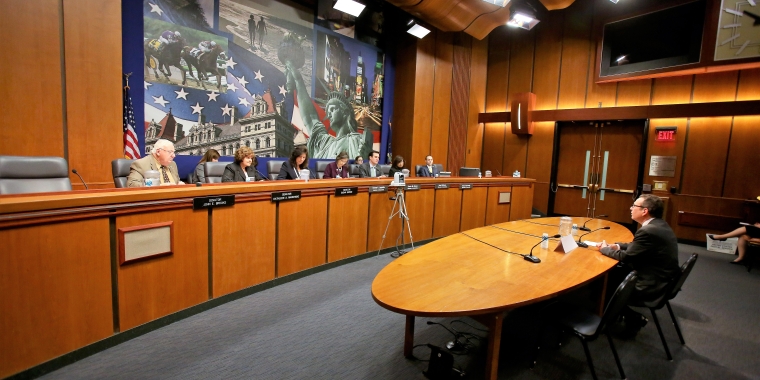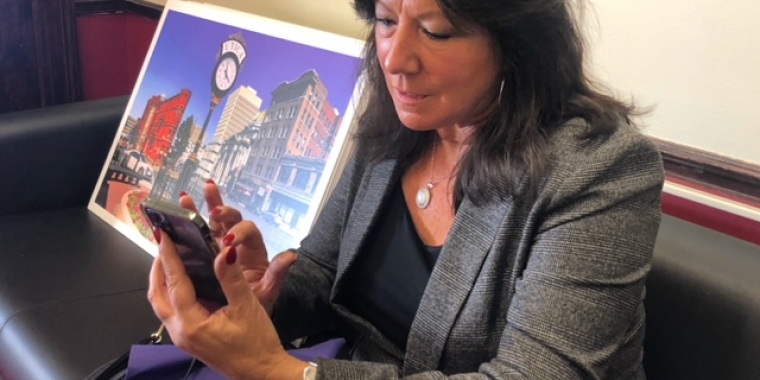AGING CHAIRS COMMITTED TO ENDING ‘SILENT EPIDEMIC’
February 28, 2017
-
ISSUE:
- Elder Abuse
-
COMMITTEE:
- Aging

ALBANY, NY—Aging advocates from across the region today appeared before the chairs of the Senate and Assembly Aging Committees to shed light on the devastating impact that elder abuse has on New York’s seniors. Senator Sue Serino (R—Hyde Park) and Assemblywoman Donna Lupardo (D—Binghamton) convened the groundbreaking joint hearing to raise awareness for the ‘silent epidemic’ and to ensure that the state is doing all that it can to protect our seniors.
Senator Sue Serino, who chairs the Senate’s Aging Committee said, “Today’s hearing is about making New York a better place to age, and that starts with ensuring that our seniors have the very basic ability to age at home—in their communities—safely and with dignity. With the help of today’s witnesses, we are laying the groundwork for real change and working to ensure that our seniors can enjoy their Golden Years free from harm and safe from abuse.”
Assemblywoman Donna Lupardo (D-Binghamton), Chair of the Assembly Committee on Aging, said, “Elder abuse is one of the most underreported crimes in our state. This hearing will provide us with important information so we can inform our budget and policy priorities to help stop elder abuse, whether it is physical, emotional or financial.”
The definition of elder abuse is broad in nature, ranging from neglect and financial exploitation to physical, sexual and emotional maltreatment.
With no streamlined method of reporting, and because abuse too often happens at the hands of a person of trust or a family member, and because victims are often unwilling or unable to report the abuse, statistics concerning elder abuse vary widely. For example, the NYS Office for the Aging estimates that for every one case of elder abuse, neglect, exploitation or self-neglect reported to authorities, five others go unreported. However, others claim that the number of unreported cases could be upwards of 20 or more for each one actually reported.
Witnesses at today’s hearing included state agency heads and leaders in the financial industry, law enforcement and elder justice.
With the Governor signaling a willingness to adopt initiatives to combat elder financial abuse in his State of the State presentations, multiple witnesses emphasized the need to seize the opportunity.
Gary Brown, Statewide Elder Abuse Coordinator for the Office of the Attorney General, testified that only 1 in 44 cases of elder financial abuse are ever reported to authorities. Further, the Office of Children and Family Services estimated in its landmark 2016 report, “The NYS Cost of Financial Exploitation Study,” that the total loss of assets seniors may be facing as a result of financial exploitation could be up to $1.5 billion each year.
The witness list also include testimony from elder justice advocate Philip C. Marshall and former prosecutor Elizabeth Loewy, whose involvement in the case of Brooke Astor – the famous New York City philanthropist and victim of elder abuse – put an unprecedented spotlight on the issue nearly a decade ago.
In her testimony, Loewy points out that elder abuse victims come from all walks of life and Marshall agreed noting that “elder abuse does not discriminate.”
Loewy draws a clear link between financial abuse and physical saying, “The repercussions of elder financial exploitation are every bit as devastating as crimes involving physical abuse, and often even more so. In addition to the loss of funds, victims suffer from emotional trauma, depression, and compromised access to food, medication and even housing—leading to a diminished quality of life and higher rates of mortality.”
Witnesses reaffirmed the troubling frequency with which abuse occurs, and many argued that it will take a multi-pronged, multi-generational approach to protect seniors and combat abuse.
Ann Marie Cook, President and CEO of Lifespan, provided testimony regarding the creation of an Enhanced Multi-Disciplinary Team (E-MDT) model to address financial exploitation that has proven successful since its launch in 2012. The approach employs professionals from various disciplines—including forensic accountants and geriatric psychiatrists—to investigate, intervene, and prevent exploitation of seniors. Since its inception, the E-MDTs have returned hundreds of thousands of dollars to seniors who were financially exploited. Last year’s state budget included funding to expand the successful program statewide.
Cook argued that approaches like these, along with raising awareness are key to combatting abuse saying, “I am convinced that our ability to help victims will be truly realized when we implement the focused recommendations we have set, when society begins to recognize and acknowledge this problem like they did with child abuse and domestic violence decades ago, and when the general public can put a face to the problem.”
The overall message of the hearing was clear and was summed up well by Marshall who said, “To be complacent about elder justice is to be complicit in elder abuse. Our silence protects perpetrators, not their victims. Today, victims of elder abuse may be strangers. Tomorrow, they may be our loved ones or, perhaps, ourselves. Seniors and society deserve more.”
To view the hearing in its entirety, please click here to watch.
Share this Article or Press Release
Newsroom
Go to NewsroomSERINO JOINS PUSH FOR FUNDING TO ADDRESS HOME CARE WORKER SHORTAGE
January 14, 2022

LETTER: HOME CARE EMERGENCY FINANCIAL RELIEF
January 14, 2022
